#fanalysis
Explore tagged Tumblr posts
Text
i didn't win the wheel: episode 1
(if anyone knows how to make gifs 🥺 please help me out until then it's shitty screenshot summer)

Alex: "I'm gonna say... 400,000."
Logan: "I'm gonna say 430,000”
ok cool let's introduce the WHOLE DYNAMIC of this episode in one still, shall we? alex is looking directly into the camera pondering the shit out of this question, and *this is logan's face*. look at that. look at that fucking smirk. alex is like "you know what? i'm going to get this question right" and logan is like "you know what? i'm gonna use the oldest trick in the pick-a-number-1-through-10 book and i'm gonna WATCH you get annoyed with me and i'm gonna love every second of it." he knows what he's doing

Alex: "Oh, you're playing that game, are you? Just gonna go a bit above?"
Logan: *smoothest fucking wink i've ever seen* *the fucking TONGUE CLICK*
ok WHAT. how am i supposed to handle this i– let's start with the fact that even before logan gave his answer he's leaning back, head cocked, gazing at alex ✨like that✨ practically about to do the arm-around-the-shoulder-thing **before** because he knows exactly how alex is going to react. that fucking wink he had that planned from the beginning. even before alex phrased it like "oh, you're playing that game, are you?" which WOAH BRAT TAMER ALEX DID NOT SEE THAT COMING and jesus christ i feel like i'm intruding on something. this doesn't even feel like ao3 this feels like the beginning of a shit 2k word wattpad draft but no this actually happened

Alex (after guessing exactly 1 less than Logan's and getting it right): "Yes!"
Logan (sunshine smile): "You're a donut..."
okay so apparently alex’s reaction to being called a donut 🍩 is that smile and leaning into logan for the first time in the video and giggling and idk fucking blushing like what kind of degradation kink is this... like i'm sorry i love you landoscar but "you freaking muppet! you got all the hangers!" will need to step aside for whatever is going on here

need i remind you this is ALEX'S reaction to kph. logan brought the k in there first guys leave your what the fuck is a kilometer bit behind ok!!! (i'll find this eventually but logan answering that question on "wrong answers only" with "i'm gonna answer this correctly. it's 1.6 to a mile" is the hottest thing i've ever seen)

aaaaaand here we go end of the video. DO I NEED TO DO A SIDE BY SIDE COMPARISON OR WHAT actually–

alright that's the best you're gonna get with preview. but LET'S BREAK IT DOWN. so we go from logan doing literally all of the talking, all of the video introduction and explaining the activity, and alex even with his whole "oooh ray of sunshine" image clearly thinks this is stupid, he even makes little sarcastic hand gestures when logan describes it. and even right in the beginning he's not looking at the camera he looks like an adhd kid sat next to the window (come on alex look alive). but THREE MINUTES of an admittedly stupid game he's done a total 180, smiling and laughing and literally that wasn't that funny but now i'm gonna laugh because you're the one who said it and leaning in to read the cards for the first time and- well logan is mostly unchanged. from the first question he decided his main task for this video was literally just to check out his teammate at point blank range with his emotions very very clear on his face (alex is OBLIVIOUS af but then again he did pull out the "oh you're playing that game are you?" and i was NOT ready for that so who knows)
ok so episode 1 is very much a warmup for the rest of the series i know that. obviously this isn't the "reaching stratospheric levels of homoeroticism that actually leave a wake of collateral damage to all compulsory heterosexuality in a 50 m radius" as charlos but holy shit it's a lot more obvious than i thought!!!
episode 2
#f1#f1 2024#logan sargeant#alex albon#sargebon#lolex#williams#williams f1#fanalysis#that should be a tag#it is now#rpf#f1 rpf#except it's not even rpf i'm not writing it#the script is already there#the fic writes itself#charlos#landoscar#rpf shipping#223#i didn't win the wheel
95 notes
·
View notes
Text
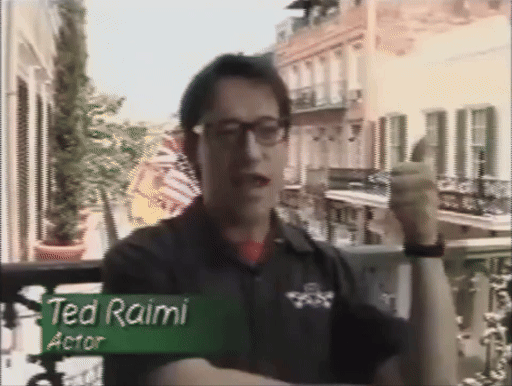

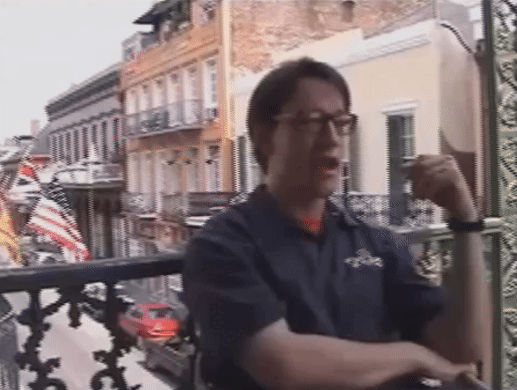




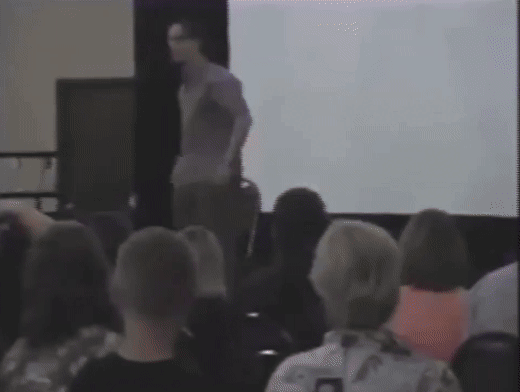
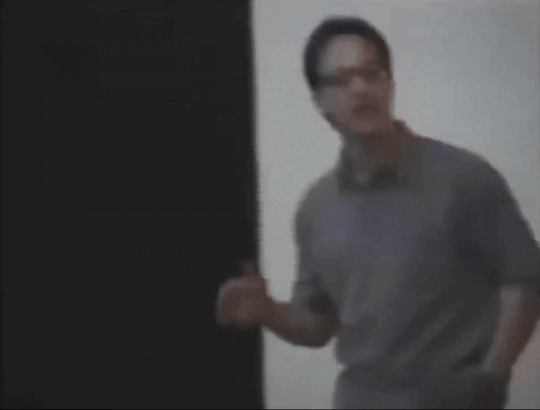
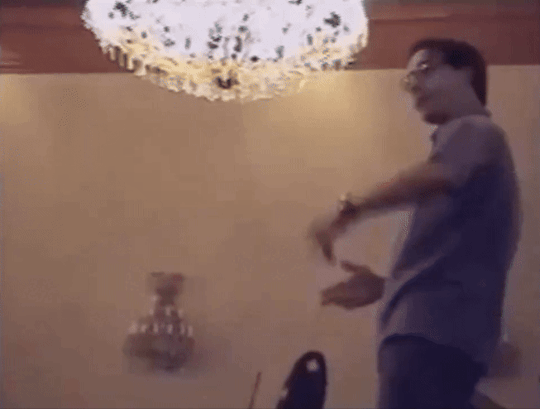



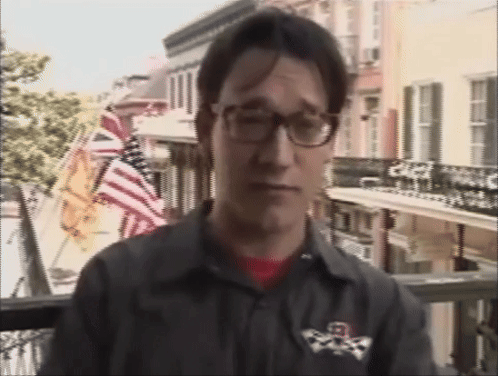


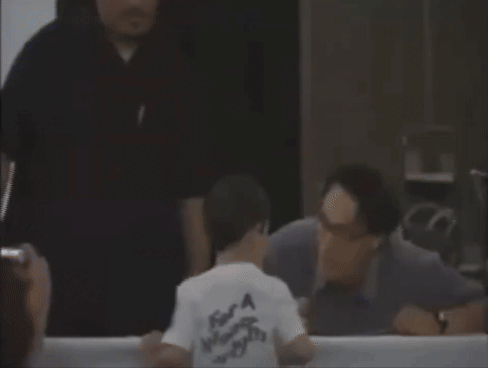
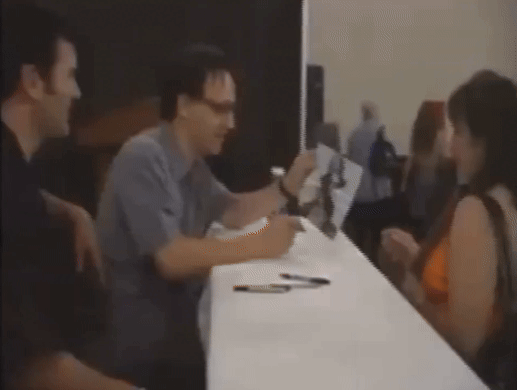
Ted Raimi as Himself in Fanalysis (2002)
15 notes
·
View notes
Text
The first time we really get to meet 17th Prince is when he's playing go with emperor the day after the imperial new year's party. 17th Prince loses, and remarks upon how much better emperor is at tactics.
A maid shows up claiming to be the girl emperor spoke to the previous night. She provides some evidence, and he believes her.
17th Prince, however, is immediately suspicious. Despite some pretty convincing evidence (emperor is many things, but he's not particularly stupid), 17 Prince realizes this maid doesn't understand poetry and thus can't have been the girl from the previous night. But instead of exposing her, he sets her up to expose herself by giving her misinformation about the poem.
Because this man is that good.
7 notes
·
View notes
Text
***Spoilers for Strange New Worlds Season 2***
I watched Strange New Worlds Season 2 Episode 3 (Tomorrow, Tomorrow, and Tomorrow) the other day, and I have Thoughts that I decided to put out there because I'm feeling a little lost as to my assessment and how objective vs subjective it is.
I can't stop thinking about it in combination with the previous episode, as well as those episodes in the previous season that deal touch on the Eugenics Wars. I can't stop feeling bothered by the fact that the term 'Eugenics Wars' has been used so many times, but not once has eugenics been discussed, at least as far as I could tell.
Trying to look at it in a different light, I can see how the way the subject of what the show calls bioengineering and the political/social fallout we're shown could be something of an allegory for the trans experience, particularly in the framework of the rise in attacks on trans rights. It didn't restonate with me that way, but my own experience is just that - my own - and as it turned out medical transitioning wasn't an option for me, so maybe that affects things. Honestly, I couldn't say. And of course, my experience in no way represents the whole.
But watching this last episode, I couldn't help but hear alarm bells in my head at the whole thing about a conspiracy involving an "international cabal" that controls human affairs from the shadows, one which turns out to be led by a group of people who look human but aren't, who have green blood and keep power by turning all the 'truly' human people against each other. Add that to more talk of the Eugenics Wars, and...well. Anyone familiar with antisemetic canards probably knows what it is that's setting me off here.
I don't know if I'm reading too much into it. I don't believe that this has been done pruposefully, though of course tropes like these don't rely on the awareness of a writer/artist/etc to exist, much less to cause or perpetuate harm. But I can't stop noticing it, and feeling bothered by it, and if anyone has a similar perspective or a new one to offer I'd really like to hear about it.
[May delete later]
4 notes
·
View notes
Text
As a person with severe poverty trauma from childhood, I really appreciate what you're saying here, and I'm so glad someone said it. American media in particular isn't comfortable with portraying poverty, unless it's The Issue of the story, or deeply romanticised or shown in the context of an upper-class white person interacting with poor people positively, to show off how they're a good and compassionate person. It's a much more common theme in Japanese and Chinese media, in my experience, and is treated much more realistically, as a thing that really happens to real people, not some conceptual Societal Issue that our well-fed white protagonist can furrow her brow attractively about for five seconds, in an aside. The first time I played any video game that had a main character struggling to get food and housing (which was not about surviving post-apocalyose) was a Japanese game. The first book I read where the protagonist is poor and hungry (which was not ABOUT poverty as the main theme) was a Chinese book.
Poverty is ugly and complicated and the effects are long-term and deeply psychologically damaging. In the US in particular, poverty is most often treated as A) some kind of Noble Sacrifice that Good People make (and which keeps capitalism afloat), or B) a self-inflicted condition caused by some kind of moral failing, much like obesity and physical disabilities are treated here.
But that fantasy about having enough to eat…I've been there. That fantasy about not wanting dad to work himself to death, I've been there too. I've been hungry, I've been without electricity, I've been without basic resources and it was NOT because my parents weren't working their ASSES OFF to support us. I've felt envy and anger and desperately wanted what other people had. I get it. That feels real to me.
The point of all this is that I'm always glad to see poor people being portrayed realistically, rather than as some kind of noble martyrs, or as the worthless scum of the earth who deserve it.
Struggling a lot with this character analysis because I really just want to say "assuming that a character behaving the way that poor kids behave and feeling the way that poor kids feel is inaccurate and 'bad writing' because you see the character as objectively good and feel this sort of behavior indicates immorality and weakness says a lot more about you than it does about him" and I don't think that would go over well.
My biggest issue with this character has always been that I didn't understand the motivations behind this behavior. I viewed him in a very uncharitable light as a result, and I was wrong. I still don't like him as a person, but I do understand him. I understand him very, very well.
Seeing that motivation cast as impossible, seeing discussions of it treated like some kind of attack—it's super frustrating. The implication is that having these feelings would make him bad and wrong in every way, when it literally gives him a valid justification, this is a real thing that real humans experience, is like...this is classism, isn't it? This is classism. Poor people aren't supposed to want things, they aren't supposed to envy their wealthier peers, they're supposed to be resilient and driven and keep going without complaint like the Noble Poors we see all those clickbait headlines about.
If they want, they're bad. To admit that they want breaks the facade. They should just be happy with what they have and do their best no matter what happens. No matter what or who they lose because they don't have the means to protect them.
The visceral implications of a character's deepest fantasy prominently featuring more food than he and his family can eat are too much for some people.
I'm willing to bet those people have never gone hungry before.
39 notes
·
View notes
Text
My Favorite Good Omens Moment:
An Essay on Why It Is Cool and Rad (Part 1)
There's this moment in Good Omens that makes me cackle every time I see it and leaves me full of warmth, so here's an essay on its context and meaning, because explication and analysis are how I show love. I will try to keep my thoughts as tight as possible, but they do have a tendency to spiral outwards, and I am very stoned. Come, sistren, and get nerdy with me.
My favorite moment in the series so far occurs in 1601. To approach it we will first need an assload of context. There's a TL;DR in bold at the end of the Context if you don't fancy reading the whole assload. Key arguments are in italics and bold throughout.
David Tennant gives Crowley a very consistent facial expression every time Aziraphale says something so outlandish Crowley can't quite believe he's hearing it. It's this one:
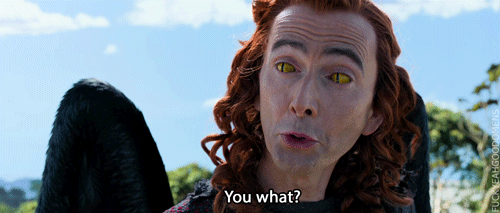
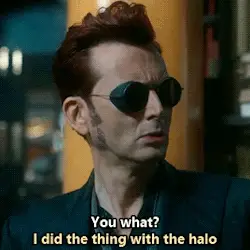
Chronologically, we see the Eyebrows of Disbelief twice before my fave moment in 1601: once (above left) in that scene on the Garden Wall that familiarizes the audience with Crowley's face before adding the dark glasses, when Aziraphale admits he's given away his sword; once when Aziraphale tells Bildad the Shuhite that he, Aziraphale, has Fallen because he lied to the angels to save Job's children.
The Eyebows of Disbelief always signal surprise and amusement with something Aziraphale has said or done. This amusement is sometimes at Aziraphale's expense and sometimes not.
In the gifs above, Crowley is laughing because what Aziraphale has just admitted to doing is fantastic and unexpected and frankly pretty gd punk rock. He's not laughing at Aziraphale, he's laughing because he is delighted with him. The only record we have thus far of Crowley laughing at Aziraphale is this one:
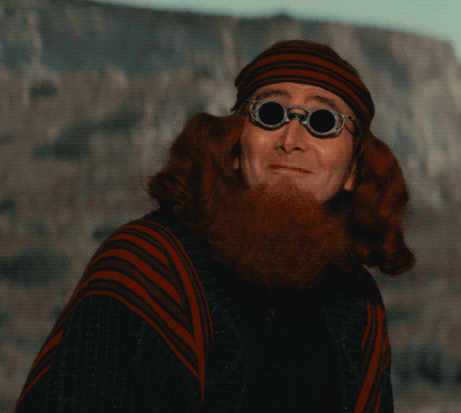
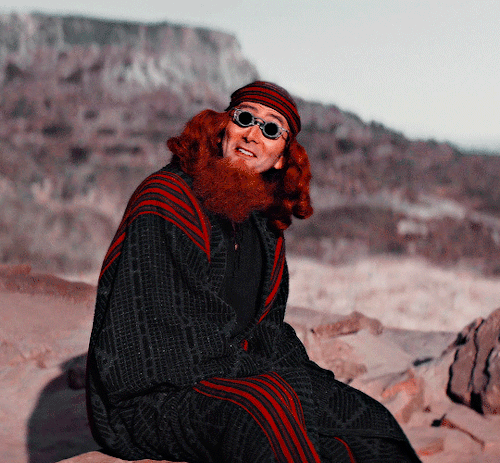
Crowley laughs when Aziraphale informs him--him, a demon who has personally been through the process of Falling--that Aziraphale is Fallen and must be a demon now. As though of the two of them Aziraphale is the expert on how and under what circumstances this occurs.
And yet when Crowley sees Aziraphale's distress--not his fear of being taken to Hell, but his heartbreak and lostness over the fact that his conscience has diverged from God's stated will--Crowley stops laughing, and instead he acts very kindly towards Aziraphale. He validates the gravity of what Aziraphale has done and assures him he won't turn him in. He sits with him so Aziraphale isn't totally alone (like Crowley probably was) as he goes through the loneliest moments of his existence to that point and picks himself up newly weighted with the secret he must now bear.
And after this scene (in canon as it stands thus far), we don't see Crowley laugh at anything Aziraphale says or does again.
And he really has to work for it sometimes. We talk a lot about the things Michael Sheen is able to convey with his face in Good Omens, and absolutely rightly so; David Tennant earns a chunk of his paycheck in this regard as well. If you haven't given yourself the treat yet, rewatch the scene in Will Goldstone's magic shop in 1941 and focus on Crowley's reactions:
youtube
Tennant takes great care to show, with precision, that Crowley is expending effort not to react to Aziraphale's nervous chaos Muppetry and lack of self-awareness. Crowley is self- and socially and contextually aware enough that he knows (better than Aziraphale, at least, which is not a high bar to clear) what's cringe, what's funny, what's ridiculous, how to behave. But whenever Aziraphale crosses a boundary of normalcy, or even sanity, and there is opportunity to laugh at him, Crowley very carefully doesn't react. He doesn't interrupt him, he doesn't try to correct him, he doesn't make fun of him, he doesn't even smirk; he just watches him, as stone-faced as he can manage, no matter how bizarre Aziraphale becomes.
We should be reading this lack of reaction to Aziraphale's social and rational transgressions as powerful positive action. Go watch the Doctor Who episode "Human Nature," or literally any episode of The Inbetweeners, or read or watch Regeneration, and reflect on what it shows you about English masculinity; then consider again the depth of significance in how English- and male-coded character Crowley treats English- and male-coded character Aziraphale in an England created by an English and male-codedpresenting author based off a book written by himself and another male-presenting author. Within its context of English masculinity, Crowley's lack of reaction is not a neutral stance; it is a very fucking loud show of support.
This is not even an inference; it's stated outright in the show. Crowley himself puts it into words 422 years after my favorite moment:
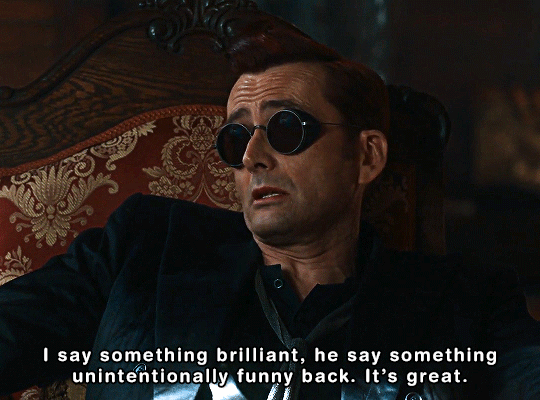
You know how Crowley calls Aziraphale "angel" because the factuality of the descriptor offers him plausible deniability to any Heavenly or Infernal agents who might be listening? Remember how Crowley is a great equivocator? Crowley is equivocating here, too: he's using the cover of what Maggie and Nina will take as a disparaging joke at Aziraphale's expense in order to make a perfectly sincere statement. This is his genuine perception of one of the relationship dynamics he has with Aziraphale and how he feels about that dynamic. Crowley thinks he himself is quite witty (an accurate assessment), Crowley thinks Aziraphale isn't sufficiently self- or contextually aware to hide how strange he is and therefore frequently says and does mad things (also an accurate assessment), and Crowley is Into. That. Shit.
Okay. Now let's look at 1601.
Chronologically it's been almost 1,000 years since we last saw Aziraphale and Crowley. In 537, Aziraphale isn't willing even to consider a labor-saving working arrangement with Crowley of fucking off home out of the damp of Arthurian Wessex; but by 1601, he's worked (and met, and Arranged) with Crowley "dozens of times now," Crowley says, and Azirapahle does not correct him.
In that millienium, Aziraphale has grown to care deeply about Crowley:

In fact he may be somewhat smitten with him:

Seriously, go back and watch Aziraphale here as Crowley approaches and starts speaking to him: he doesn't start smiling until he recognizes that the person speaking to him is Crowley (but he only smiles at Crowley while Crowley's not looking at him).
And Crowley is definitely become smitten with Aziraphale:
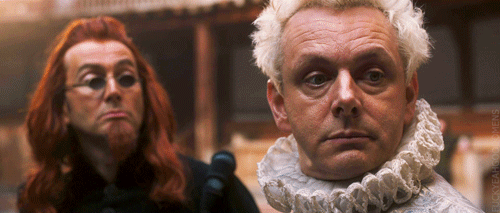
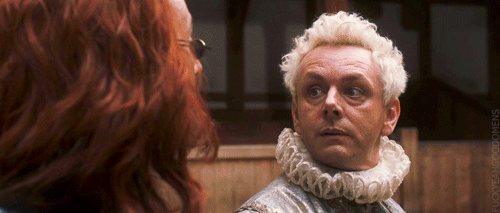
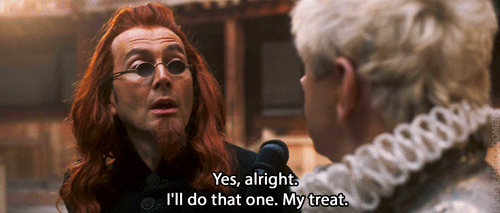
Our man(-shaped entity) is so allergic to work he sets up a meeting to weasel, cajole, or (as it happens) cheat a coin toss to get Aziraphale to do an easy temptation for him in Edinburgh, and then in the same conversation agrees to miracle a play into success because Aziraphale gives him a single hopeful look. Crowley's got it bad.
TL;DR: The Eyebrows of Disbelief happen when Crowley is surprised and amused by something Aziraphale has said or done. Sometimes that amusement is delight with Aziraphale; sometimes it is at Aziraphale's expense. Crowley is aware of this distinction, and when his amusement is at Aziraphale's expense, he suppresses it, even when it takes some effort on his own part, and remains stocially composed. This is equivocation on his part: to Celestial/Infernal operatives lacking knowledge of the intricacies of human behavior, this non-reaction would seem like neutrality; to Aziraphale, who shares with Crowley and the audience the contextual knowledge of English masculinity's utter viciousness, this non-reaction is a profound show of support; and in the safety of support from Crowley, Aziraphale lets his weirdness blossom.
As another meta points out [link if I find it again], we also see in Aziraphale's wordless request about Hamlet and Crowley's immediate understanding of it that by 1601 Aziraphale and Crowley have developed an unspoken, coded method of communication with each other.
Now that we have all of that in mind, here's my favorite moment in Good Omens:
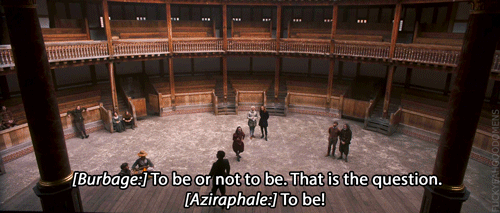
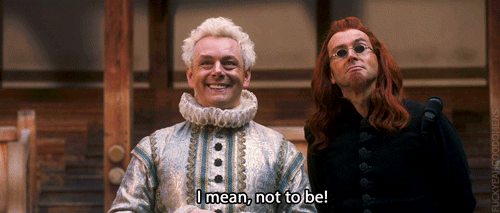
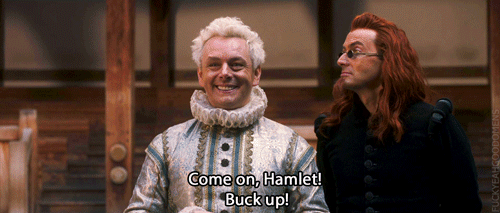
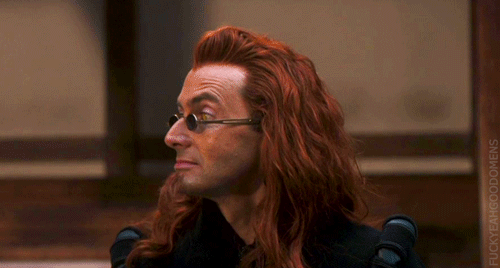
Ixi of Fuck Yeah Good Omens has even kindly archived a closeup of the aftermath, for Crowley, of "Buck up!" In gif 4, above, you can see that the tiny smile is an involuntary reaction that happens as Crowley's eyes widen: for a fraction of a second, he's caught off-guard. In the closeup it's easier to see that he suppresses the smile and gives a tiny shake of his head, Eyebrows of Disbelief heading for his hairline.
There are a number of things Crowley's reaction could mean and what messages it could communicate (we'll get to that in a sec), but regardless, his reaction is, unquestionably, one of surprise and suppressed amusement. This is an aspect of Crowley and Aziraphale's relationship and characters that I like very much, viz., that one of the reasons Crowley likes Aziraphale (though Aziraphale is judgy and occasionally, unintentionally, horrifyingly cruel) is that in addition to being one of the kindest and most courageous beings in existence, Aziraphale is mad as a bag of frogs. Crowley does not know what is going to come out of Aziraphale's lovely mouth next, but Crowley does know there's a good chance he will struggle to believe he's hearing it, and Crowley likes that.
That's what makes this my favorite moment. What makes this moment so cool and rad, though, is its ineffability. We know from the Eyebrows of Disbelief that Crowley is surprised and amused, but any of several things could be read in that almost imperceptible headshake. Like:
What are you doing? or
Why are you like this? or
How can you be aware that you say these things out loud and yet still say them out loud? or
How has my existence come to this? this moment of listening to such insanity?
each of which is a fair and just feeling to have/message to communicate to a man(-shaped entity) who is yelling "Buck up!" at Hamlet.
But that's only if we read Crowley's amusement as being at Aziraphale's expense. And I don't think we should. Because watch Aziraphale here:

He's doing it on purpose. He is shouting a hilariously inappropriate, 100% authentic Aziraphale-brand thing over arguably the gloomiest passage of Shakespeare's famously gloomy play--right after Crowley complains about its gloominess--and he is watching Crowley as he does it. Look at his smile! He knows he's being Deeply Uncool, and he is doing it literally right into Crowley's face.
Remember that we just talked about how by this point in the chronology Crowley and Aziraphale have learned to communicate with each other nonverbally through facial expression? So what does it mean when Aziraphale responds to Crowley's grumbling about Hamlet's gloominess by smiling his minxious Mona Lisa Aziraphale smile, looking right into Crowley's face, and yelling at Hamlet to buck up? Aziraphale, in a carefully coded, carefully Aziraphale way, is joking with Crowley. His silliness in this moment is for Crowley.
So with aaaaaaallllll of this essay in mind, what does it mean that Crowley's reaction to "Come on, Hamlet! Buck up!" is widening eyes, an involuntary twitch of his mouth toward a smile, and then, his eyebrows still showing surprise and amusement, a tiny shake of his head?
Once more, with inferences:


I do propose, y'all, on the basis of this web of evidence I submit for consideration, that what we are seeing here in my favorite moment of Good Omens is the ineffable equivalent of Aziraphale and Crowley sharing a laugh.
Crowley's amusement here isn't at Aziraphale, because Aziraphale is eliciting that amusement consciously and deliberately. Aziraphale, in good spirits and happy to see Crowley, uses his Aziraphaleness to offers Crowley not only an opportunity for amusement, but the opportunity to be in agreement with him about what in this situation is funny. They're on the same side of this joke.
And his humor lands just as he wants it to: Crowley, just for a moment, is caught off-guard, and tickled--
But remember, Crowley is worried in this scene about being surveilled ("I thought you said we'd be inconspicuous here"), and he worries about audio surveillance a lot ("Walls have ears"; "Don't say that. If my lot hear [etc.]," etc.), so he's very limited in what reactions he can show or voice. Aziraphale knows Crowley must be perceived by anyone watching or listening to disapprove of his, Aziraphale's, behavior (just as he must be perceived to disapprove vociferously of Crowley's). Both of them know this.

--so Crowley suppresses the smile almost successfully, and shakes his head at Aziraphale, minutely, to say Stop. What you're doing is working, you're close to making me laugh, and if I show how much you have just delighted me, it will blow our cover of "just an Arrangement."
I offer three final data points in advancing my argument that what we see in my favorite Good Omens moment is Aziraphale successfully attempting to joke with Crowley and Crowley recognizing that overture from Aziraphale and being momentarily surprised into a reaction of genuine delight before pulling his face back under control and indicating to Aziraphale that he must stop:
Datum 1. Nothing going on with Crowley's face in this moment is accidental. We know for sure we're not seeing David Tennant react to Michael Sheen here not only because of literally every other point of Tennant's and Sheen's performances in the show, but because Tennant is wearing opaque contacts and sunglasses under film lighting and therefore cannot be reacting to anything more compelling than a level-10-lift blur because Tennant cannot see shit. Crowley's reaction is a deliberate and careful performance choice on Tennant's part, and it's underscored by director Douglas Mackinnon's choice to film Tennant in 1/2 profile to keep Crowley's eyes visible and face readable to the audience. This reaction is supposed to be there and supposed to be meaningful.
Datum 2. The husbands in 1601 is not the only moment in Good Omens when we may be seeing an angel and a demon communicate the message Stop doing that, it makes us look too familiar between themselves with a little headshake:
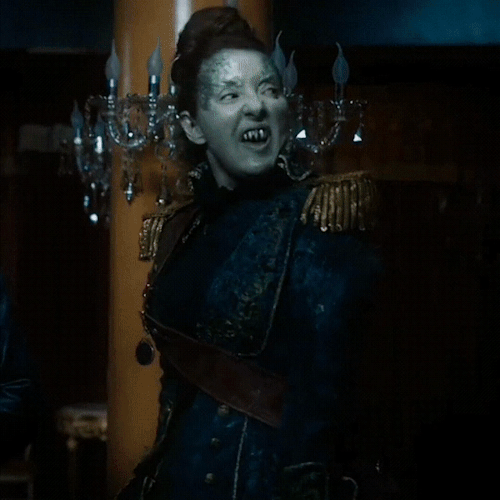
Datum 3: There is another moment in Good Omens when Aziraphale offers Crowley the opportunity to enjoy a joke with him. There, too, his humor lands just as he intends, so we can use this other moment as a comparison to our 1601 moment. I don't have gifs for it, but go back and watch it, S1E6 49:27-42. Snips below.
Aziraphale says something that surprises and amuses Crowley (he asked Hell for a rubber duck while he was sloshing around in the holy water)--
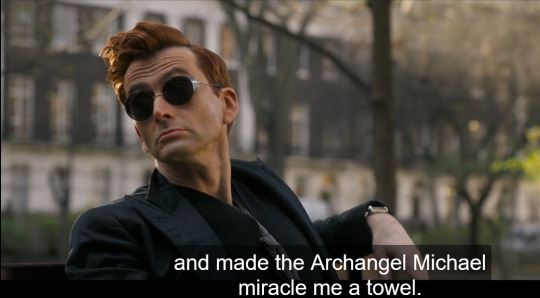
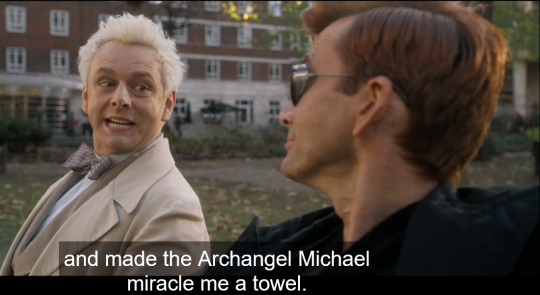
--but what Aziraphale says makes Crowley smile long before it makes him laugh.

In fact, his laugh, though a genuine cackle, is quite delayed, and he laughs only after Aziraphale starts laughing too.
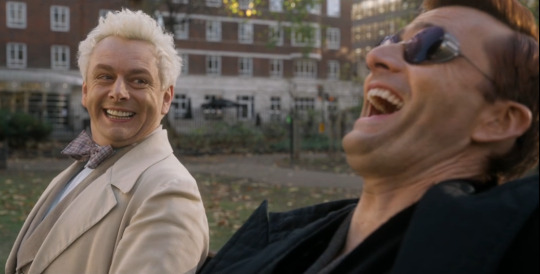
In other words, Crowley's reaction to Aziraphale offering him amusement they're both on the same side of is exactly the same as his reaction to "Come on, Hamlet! Buck up!" right up until he laughs instead of shaking his head. Here, after Armageddidn't, Crowley doesn't have to suppress his reaction, so he can let the smile bloom; he doesn't have to control his response, so, although it takes him a few extra seconds, he lets the smile turn into a laugh.
But in 1601, it's not safe to laugh at Aziraphale's humor. It's not safe even to smile at him. A single piece of evidence or eye/earwitness testimony that he and Crowley have anything more friendly than the most passing and acrimonious of professional relationships could mean death to either or both of them, and depending on what Falling is like, maybe something worse than death for Aziraphale.

But Aziraphale is so funny, so effervescent for Crowley, at Crowley, that it catches Crowley just for a moment. Crowley's eyes widen and the corner of his mouth twitches toward a smile.
And that's dangerous. If Aziraphale keeps acting so charmingly mad, Crowley is going to laugh, and they can't afford that risk, so he shakes his head at Aziraphale. Stop, or I won't be able to keep a straight face around you.

And Aziraphale apparently receives that message, because he immediately eases off. Less than 60 seconds later we learn that he's deeply concerned for Crowley's safety--and that it's not so much that Aziraphale has Crowley wrapped around his little finger as it is that Crowley has wrapped himself around Aziraphale's little finger like a snake arranging itself on the tree branch it calls home.
UPDATE 14/10/23: HOLY SHIT Y'ALL IT GETS EVEN BETTER! THERE IS A SEQUEL!
#good omens#good omens meta#good omens 1601#good omens microexpressions#good omens headshake#angelfish#aziracrow#ineffable husbands#good omens fanalysis
1K notes
·
View notes
Note
I REALLY don't like Kiriona she's like a pale shadow of Gideon. Like God's reconstruct of Gideon not ACTUALLY Gideon. Like I know Gideon is protective of Harrow but THAT seems a bit much.
You and me both, friend!
I've seen posts about how Kiriona is just... the Gideon the world sees. The Gideon that's not narrating the story. Gideon but Unsympathetic.
I think that's true, to a point. But she's not making lame jokes. She's harder, somehow. She's definitely been changed, she's hurting-- Nona herself noted that she's "the saddest person in the world". Now, Nona doesn't have the perspective to know what's really saddest in the whole universe, but Kiriona is undeniably SAD. She's not fighting desperately against her circumstances, but she's not happy that way either, so it's not because she WANTED them this way. Is she RESIGNED?
And also clearly longing so much that our resident mind-reader (/j) knew she wanted to be kissed. I think she wants to be loved. Which is Gideon Nav through and through, don't get me wrong, but I suspect this is a Gideon that has lost her whole world, and doesn't know what to do with herself.
I don't think we'll get The Old Gideon back, too much has happened, but I hope she doesn't stay this way, too.
12 notes
·
View notes
Text
goodbye to a world
reading between the lines of the various goodbyes and dismissals to logan sargeant
Pt. 3: Oscar (press conference)
full series
not a goodbye (in the traditional sense of the word) but a fucking statement. obviously. because piastri.
the loscar dynamic is absolutely FASCINATING. out of all the friendships in the grid, this one plays a special role: it reminds the audience that there’s so much more than formula 1, there’s so much more to f1 drivers than this stage of their career. most of us (spectators) have a broad conception of the “typical” driver backstory; rich kid with rich parents, got in a go kart at age 4, karting and then single-seater and junior series was their whole life and they climbed up the ranks like rungs on a ladder. i think a lot of people who only watch f1 (myself included) tend to focus so much more on the Pinnacle of MotorsportTM that everything else just seems like prep. even though most if not all of the drivers grew up either 1) racing each other 2) watching each other on tv, we don’t really think of these relationships beyond and BEFORE f1.
until loscar. because what draws them together? they’re not teammates. they’re not rivals. williams is so far behind that they’re not even competitors. in many way, logan is entirely “out of oscar’s league”.
and yet they have this endearing, sweet, playful friendship that’s exactly what it seems like: people who have known each other since they were kids, grown up together, watched each other become the person they are today. there’s a casual, domestic intimacy neither of them have with their teammates, even if those relationships are also going well, because there’s this history element.
which is recalled no more vividly than when oscar and logan are compared. as they are too often.
total polar opposites. f1 stories practically the inverse of each other. one was a promising young talent who f1 teams had been keeping an eye on for years that, once thrown in the car at that “wait! isn’t he just a kid??” age, immediately proved his worth as a future superstar. Future World Champion, to quote the official moniker. “look at him go! look at OSCAR PIASTRI!” he’s a prodigy, he’s a social enigma, he’s a raw force of pure and driven talent.
then you have the other promising young talent who one f1 team had been keeping a loose eye on for years. who’s never done any free practices or tests. who’s barely even dipped his toe into the waters of f2. who’s shown a lot of raw potential but more noticeably, glittering fancy sponsors. who gets chucked into a car as a last-minute, scrapping underprepared and thrown-together plan B after the previous f2 graduate fails to keep his seat. and, while oscar soared off into the stratosphere, logan flops IMMEDIATELY.
go fucking figure. it’s almost like people like max verstappen and lewis hamilton are exceptions to the rule, not the rule itself, and an underprepared rushed overwhelmed rookie is actually NOT in a position to achieve immediate stardom! in fact, maybe that’s the OPPOSITE of what they need! so, in loscar, we have the exception to the rule (oscar) and the rule (logan). but that’s not the solidified narrative; the story, how history will remember the two of them, is that logan was nothing but a pale and washed-out shadow. always. open and shut case.
what does oscar have to say about it, though?

this was said to gp blog (great website); the full quotes from him are:
I sent him a text yesterday. He seemed okay. Obviously a little bit of a shock. Obviously it wasn't an easy time for him in F1. It was much more difficult for him than maybe I expected it to be going into F1. I think for me, his potential was much greater than what was on show in F1, for whatever reason it might be.
I know firsthand, being his teammate in the junior categories, racing him in basically everything, I know how quick he is. I don't think the change was completely unexpected...
Best of luck to him. Just a shame that, for whatever reason, he wasn't able to show everything that he's got. Because in the junior categories, he was genuinely one of the quickest guys I went up against. I think his potential is much greater than what some people have seen.
first of all, some BEAUTIFUL toeing-the-line from oscar here. he’s even more subtle than alex in that none of his words imply any sort of passive aggression or ill intent; the only emotion that’s really conveyed, in understated tones, is a mild perplexity about logan’s career and failure in general as opposed to its gut-wrenching end in question. the implications in his wording imply nothing more than a personal opinion, but the ambiguity itself is some massive shade. let’s take a closer look:
much more difficult for him than maybe i expected it to be- this is masterful. “yeah, that’s right. i’m the next-gen prodigal superstar talent with my future as a world champion pretty much written for me, and i’ve shown the skill to back it up, and not only did i know logan before the catastrophe of f1 but i regarded him with so much respect that i had actual expectations. his skill had become such an intertwined part of his character in my eyes that i just assumed things would go so much better. because i believed in him.”
his potential was much greater than what was on show in f1…- toeing the line again. balance. acknowledging both the reality and all the roads not taken. “i’m not making false claims. i’m not making excuses for him. i’m not blaming the car or the team or the lack of support or the disgrace or the mistreatment and i’m not challenging the results. i’m not talking about what happened, i’m talking about what could’ve happened. potential. i’m talking about everything that wasn’t on show– and by not on show i mean that his potential, his skill, his pace, him as a person was not seen or understood or respected or prioritized by anyone. i’m not saying ‘oh, one point in 36 starts is all anyone could do with x/y/z excuse’ i’m saying ‘you guys missed the point’.”
for whatever reason that might be/just a shame that, for whatever reason- fucking hell, this is harsh. this is practically an attack. “i’m not gonna make excuses, but i’m gonna leave this open. i’m not gonna call this bad luck or the way it goes sometimes or a bad break, i’m saying that Whatever Reason This Happened is not what should have happened. not a matter of chance or objective misfortune; this situation could have and should have worked out better and whatever obstacle got in the way of that was a matter of misjudgment.”
I know firsthand, being his teammate in the junior categories, racing him in basically everything, I know how quick he is- alex said something similar, about pace. “raw speed” he calls it. and it’s really interesting that his teammates, who learn firsthand about him as a racer, his driving style, his strengths, his weaknesses (whether they’ve been teammates for months or years) identify a specific trait/skill about logan rather than just making the empty claim that “he’s good” or “he’s better than this”. and this is very interesting coming from oscar in particular given his current teammate. lando isn’t the best starter or the best defender or the most coordinated overtaker, but even with all the areas he needs to work on he can still compensate for it by being really fucking fast. his pace is his defense; he gets clean air and boom, he’s fucking gone. obviously that’s an oversimplification but oscar directly competing against that and observing/absorbing that and bringing up the same category of skill in logan– even in flashback– can’t be overlooked. in addition: “yeah, i’ve raced against him in basically everything. you’ve watched him on tv in a backmarker team for a season or so? i’ve known him for YEARS. i know. i don’t care what you’re seeing, i’m the expert on this and i know.”
I think his potential is much greater than what some people have seen- shit, this is as close to passive aggression as he gets, but it’s still done so precisely and subtly that it’s almost an art form. i mean, leave it to oscar piastri to use the phrase “some people” and NOT make it sound like a straight up, poorly-veiled callout. try to use that in a sentence without seeming like you’re shit-talking someone, potentially in the room. this is part of the lovely passive-aggression classic: “….unlike SOME people” (sometimes while staring at them directly, depending on how passive you want the passive aggression to really be. so, he’s (in unofficial terms) calling out who– anyone who hasn’t seen logan’s potential. who have underestimated him. who have invalidated his situation and him as an athlete. this could be any category of haters– negative fans, petty journalists, the horrid type of reports who will ask questions like “what does it feel like to be the slowest driver in formula 1…”. and that would make perfect sense. almost perfect. if we thought oscar piastri paid any attention to the haters, his own or anyone else’s. if it was ever on his mind. so, people who haven’t seen his potential… what, like, team principals? the ambiguity in itself is simultaneously a direct implication and oscar piastri’s intelligence needs to be studied because it is sometimes terrifying.
oscar doesn’t make a statement on social media, doesn’t bring it up further, doesn’t make any sort of personal goodbye available to the media– of course he wouldn’t, not just because that’s incredibly private but also because he’s oscar and he’s basically kimi raikkonen (in this analogy lando is sunshine boy seb but that’s an idea for another post). oscar’s whole public image is that he doesn’t want to have a public image. he doesn’t give the media any more parts of himself than he’s contractually obligated to. what he does give is concise, serious, the strongest points in the fewest words. and because of the enigmatic, tantalizing nature of that approach paired with the fact that he’s a fucking brilliant driver, people listen to what he has to say.
so oscar has a lot more weight to throw around than alex. alex’s image is that he’s a cuddly sunshiney cat dad who is a living anomaly in that he’s a good driver and a total sweetheart at once. whether or not what he says comes from the heart (it does. he’s alex) the reaction can always be “awww look at alex he’s such a nice guy :)” and the focus is on the kindness of the gesture/praise/respect itself rather than what alex is actually saying. so if alex says logan had more potential, that’s alex being alex.
if oscar says logan had more potential, that’s a fucking statement. and if the media wasn’t coming for JV’s head at this point, oscar just gave them a diagram for how to build a guillotine.
beautiful.
#f1#formula 1#fanalysis#goodbye to a world#logan sargeant#oscar piastri#op81#ls2#f1 2024#williams racing#williams#mclaren#mclaren f1#jv#fuck james vowles#aka james consonants#my writing#alex albon#loscar#shoutout to simi#august 27#dutch grand prix 2024
71 notes
·
View notes
Text
That's so valid. It really does take a lot of dark turns, and had I not related to Elphaba so much I'm not sure I would've finished it myself. (Though for me it's less the dark tone that bothers me, and more the rotating cast and meandering plot. There's not much of a common throughline besides following Elphaba...)
If I may postulate on the musical/movie version then, given that I've only listened to the Broadway cast recording cd and seen the movie: I imagine there ARE other activists. Dr. Dillamond in the movie began TELLING them what was going on. He didn't get through the whole story to the class, but it's something he wanted to share. The Animals weren't keeping it all to themselves the way they seemed when Elphie followed him.
There are also books that she'd read with their history in it. I find it hard to imagine, through a realistic lens, that there weren't other sympathizers. At least while they were at Shiz, and at least where Elphaba had access to books, the truth hadn't yet been censored out!
And the song mentioned Animals in other professions, careers with a crowd. The mural that was revealed (when Elphaba tossed half the area in the air, I think?) showed Animals, and though that mural had been covered up, I'm sure there were families that had older generations that had seen those Animal professors and told stories about them to their children.
Fiyero had helped Elphaba rescue the Lion cub, after all. Maybe there were more sympathizers in his country?
Hatred and bigotry can be contagious, but so can respect and support! But you're right that it would be really neat to see. And maybe even a little bit topical...
One thing I find hard to buy in Wicked, that I understand why is not addressed in the musical, could be addressed in the movie, but I don't think it will, is... Elphaba can't be the only Animals right activist in the land.
Like, that they are extremely rare, I believe. But not nonexistent. Or, heck, what of the Animals themselves?
You'd think Elphaba would gather quite the little resistance in her castle; the last safe haven for Animals in Oz, immediately vilified and made to be an "invading army" or a "rebel separatist force" or whatever, when really it's a refugee camp. I'm always thinking, how is that woman eating? It would make a lot more sense if there is a surrounding community to her, that is doing things like growing food and making clothes.
Alas, it is too big of a change to fit in the movie. I just think it would be neat.
22 notes
·
View notes
Text
Okay I'm about 60% into book 3 now, Holden has been taken from the Ring Station by Martian marines and went through initial interrogation, so now I have more blather about Novel-Holden v Show-Holden.
In the novel, we see Holden start to believe he really is special, pushed to that conclusion by the (ultimately erroneous) belief that the woman who did the things Clarissa actually did was Julie Mao - that Proto-Julie set off a cascade of events designed to get Holden specifically through the Ring, just like Proto-Miller seemed to he aiming for. He sees that Ring Station, and he head for it without prompting to look for answers, because he believes the protomolecule wanted him here for a reason, and going there would mean both fulfilling his purpose and finding out what that purpose is.
Then Miller reveals he was 'chosen' simply because the real Miller felt a certain way about him - trusted him, it seems to boil down to - and the protomolecule then reached out to Holden bc it absorbed Miller's consciousness, and Miller saw Holden as the guy to get things done, and...that's it. But Holden continues to think more must he at play because why then did Proto-Julie go to such great lengths as part of this conspiracy to bring Holden here? She didn't know him after all.
When Holden explains everything, starting from first seeing Miller a year before, it all hits him - he isn't special at all. He doesn't actually care about that; what he cares about is the fact he bought into it at all. He feels incredibly foolish. Humiliated by his own hubris. I imagine that will get even stronger when he realizes the actual woman behind it all was Julies very much alive and protomolecule-free sister. Holden doesn't necessarily desire being special, but that he jumped to that conclusion at all is humiliating to him.
Then we have Show-Holden. We see Show-Monica suggesting more than once that he's special, but Holden continues to refute it. Even when she says 'I think you are, I think you know you are, I think you like it' he calls her out - says he thinks she's just trying to get a rise out of him. This Holden, much like the written one, would feel foolish if he believed he was special and wasn't. It's possible that part of why he insists he isn't is the belief it would be foolish to think it regardless of evidence presented: the hubris he doesn't want to fall prey to, and which Novel-Holden does.
He also never has the factor of a belief that Proto-Julie is involved. How would that affect Show-Holden though if he did? Would he ask again what makes him special in the way he once asks Proto-Miller the same?
A part of me thinks he wouldn't, because of where the urge to even ask that seems to come from. Show-Holden has had been made very aware of the potentially far reaching consequences of his actions. His sense of responsibility prevents him from doing otherwise, even when he disagrees about the specifics of what he is or isn't at fault for (e.g. he sees his role in the earth-mars conflict earlier in the show as different than other accuse him of, because he sees something that the viewers, on the outside looking in, do: that this was a conflict that had been building over decades, maybe centuries, to the point that what would set it off would be less an instigating element and more an excuse. We see how the political machinations of those like Avasarala reveal this: she's aware that it's an excuse those two militaries and governments are looking for, and her efforts to prevent war are all focused on removing any potential excuses, which she recognizes as a stop-gap solution more than anything else).
Holden's awareness of that is made explicit in the scene on the Station. He refuses to complete that circuit until Proto-Miller tells him what the consequences will be: specifically, what harm it could or will do to others. Seeing a more 'human' Miller who talks about Julie and how it was to die is what enables him to go forward with it: he's shown a version of a man he trusts to *care* about those consequences. He's been reassured that this isn't a malevolent entity; perhaps even one of compassion, even if that compassion originates from the memory of Miller's mind rather than the protomolecule itself. A sense of urgeny does the rest.
So what about that urge to ask? I think it comes less from a place of wanting to know for its own sake, and for his concept of himself, and more from wanting to know so far as what that could mean for humanity in general. He asks 'why me' because if he knows why, he can use that information when he weighs his choices; a calculation. It's not about him - it's about the protomolecule's motivations, by whatever definition of 'motivation' might apply. The content of those motivations then in turn inform him of whether doing what it says will have dire consequences or if those dire consequences are what will come to pass if he refuses. And, 'knowingly' or not, it becomes a matter not so much of the real Miller's trust in Holden, but about Holden's trust in Miller.
That trust comes into play in Season 4, when he helps Proto-Miller out by fixing the planet's machinery, to put it one way. Proto-Miller already told him how to stop the Ring Station from destroying all those inside, and the rest of humanity along with it. It's not like when he trusted the info that got them in the Ring safely - that was about hinging their lives on Proto-Miller's need for a 'ride'. Negotiates for their safety with it. But how to save humanity from destruction? The protomolecule would have no interest in that: as he says, it's like paving over an anthill. Humans mean nothing to that force. Malevolence or benevolence are a non-factor. But Proto-Miller acted with benevolence by giving him the information he needed to understand how they could all survive, how to show they weren't a threat. Holden doesn't have to trust the protomolecule's non-motivations...he only has to trust the rememnants of Miller he came to see while inside the station as the apparition spoke about his moments with Proto-Julie on Eros; his feelings about death, which meant he *had* feelings. Compassion, fear, regret.
It puts the question of 'why me' in the backseat. Holden doesn't need to know anymore. He had the real question behind 'why me' answered: got the information he was really concerned with (or at least he believed he did). This is demonstrated when the question expands from 'why me' to 'why us': Holden wonders and asks multiple times if humanity as a whole has been chosen for some unknown purpose, if there's something about them that made the protomolecule open up the universe to them or if their humanity is simply incidental, along with their existence. If they're just tools, then what kind of tool? Does the protomolecule, and possibly the builders who made it, need something from them, and if so, what is it?
The thrust of the question hasn't changed. Holden wants to know if humanity's actions - their choices, their behavior, even their mere presence - will have dire consequences, or if *not* continuing to use the Rings will. This is a Holden who will ask 'why me' only up until the time to act comes: why or how he ended up in the position to do something stops mattering - all that matters is the fact of him being in that position and then actually doing it. The reasons aren't important unless they affect the outcome.
I'm not trying to suggest that Show-Holden is some perfectly altuistic person, selfless to the point caring nothing for what happens to him and only what happenes to others, but he does prioritize it. He alters his behavior not only to prevent death and institutionalized harm but to be kinder to people he loves. When he's made to realize in Season 6 that his apparent disregard for his own safety hurts the people who love him, he promises to do better, then does. He priotizes the people he loves not because they have some greater purpose but because they're important to *him*. He cares about his home and his family and sees preserving those things as important for their own sake, and for himself. His needs, including emotional, do come into play. As they should.
He still fucks up, still gets things wrong, still has all the flaws he has, but that's good, because it makes his character feel like a real person and not just a symbol - some idealized version of a hero that either turns the character two dimensional or elevates them beyond realistic expectations. The show and novels both examine what it means to be human; the things we value, the ways we behave, how our emotions manifest in actions - our flaws, our limits, our strengths, our potential. Having your main hero escape all that somehow would run counter to the story's messaging, whatever its format or version.
As for Novel-Holden's motives behind that question, I'd say that's yet to he revealed, but I'll probably write another long rambling post about it when it is
9 notes
·
View notes
Text
Another Post About Crowley's Terrible Handwriting
Actually his handwriting here isn't terrible, it's just, like Anathema's spelling, 300 years too late.
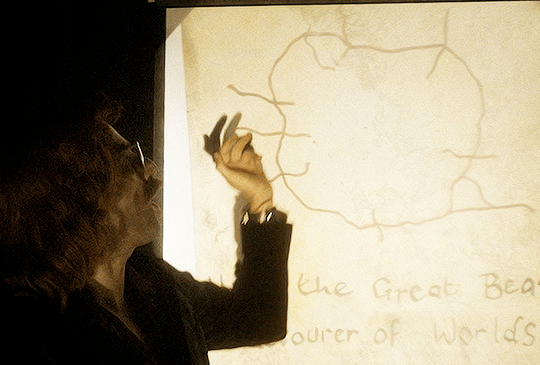
So first, I posit that we can be reasonably confident this is Crowley's handwriting because he is very likely the only celestial being besides Aziraphale who can spell devourer correctly.
Crowley has taken more care than usual with his penmanship today because this is a Fancy Presentation, and there are some delightful things to note about it:
--The beautiful serifs on each letter and variation in width of the strokes (the lowercase r's especially)
--Enthusiastic but intermittent capitalization of nouns
--The L that ends "Hail" is a small capital like the ones used in the Bible to spell LORD; the l in Worlds is lower-case
--The lozenge shape of the letter o
--Both s-es are oversized and dip below the writing line
--The kerning is terrible, the script wanders off the writing line at several points, and the location of the writing line is not imagined consistently
I am not an expert in the history of handwriting, but every single point of this suggests to me that Crowley learned to write in English in the late 16th or early 17th century, between say 1570 and 1620, and he learned to do it by copying printed material, not somebody else's handwriting. And it looks like late 16th-century writing. Or rather, like somebody learned to write by copying late 16th-century print and hasn't practiced enough for his style to change significantly in the last 400-500 years.
This means Crowley would have learned using a quill pen, poor devil, and if that's true no wonder he doesn't do it more often. (I wonder if this is why he now owns a pen that looks like it can break the sound barrier; if the Bentley is a permanent replacement for the loathsome, buttocks-abusing horse, maybe he keeps the expensive pen as self-reassurance that he'll never have to write with a quill again.) Quill pens would explain the lozenge-shaped o's: quills can only make a downstroke, so writers who used them shape o's as lozenges made of four downstrokes. Someone who learned writing with a quill would shape his o's like a calligrapher.
16th/early 17th century is the earliest I think Crowley would have learned to write in English because before that there was no block print; there was no print at all, only handwritten scripts of varying legibility, none of which look remotely like Crowley's handwriting does.
Here's what print looked like in Germany in 1471 (printing does not arrive in England for another 5 years after this):
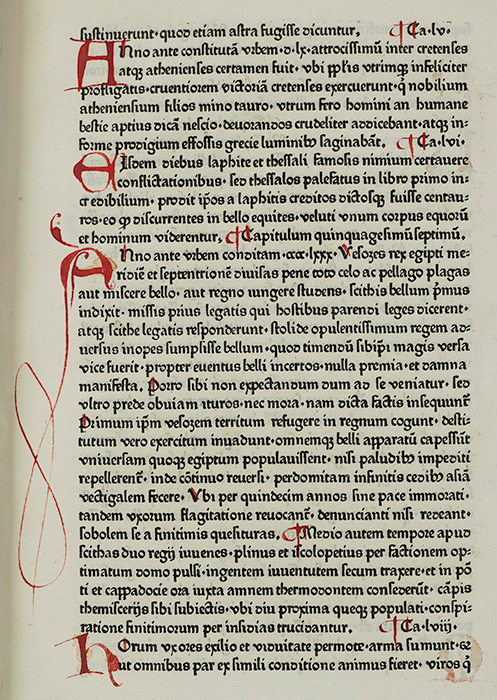
The printing press showed up in England in 1476. Between 1500 and 1600, England got its shit sorted out wrt fonts and typesetting and started turning out what we would recognize today as readable material.
Here's what English printing looked like in 1623, c. 150 years after the German one above:
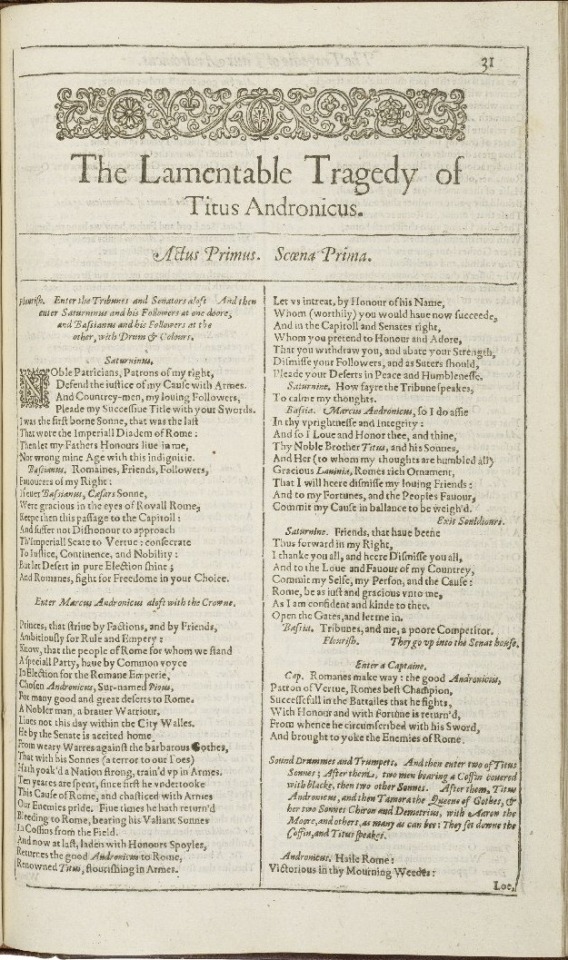
Not bad, right? I've received Xerox copies less legible than this in classes I paid for. I think it is likely based on his handwriting that Crowley learned to write from printed material a decade or two older than this. The adornments Crowley puts on his letters are serifs, not ligatures: these are not letters that were ever meant to join up in cursive, but letters that were copied from typeset.
From the 16th through the mid-19th century, variations in how a handwriter capitalized letters were very common, and two of these variations show up in Crowley's writing as well.
First, English inherited from German the capitalization of all its nouns. You can see it in Titus Andronicus, above (1623). Due to variations in education and taste, this quickly shifted to capitalization of whichever nouns the writer (or publisher, or printer) felt were important to capitalize, as you can see in Paradise Lost from 1688, below. Hail the Great Beast, devourer of Worlds.
Second, It was also very common during this time to capitalize terminal letters of words, either as a sign to the reader that previous letters had been omitted or because writers using quill pens wanted to be sure readers knew what letter they were looking at through the smudges and weird spacing and general wretchedness of the reading experience imposed by quill writing. I think this latter reason may be why Crowley writes "HaiL" when his other letter L, in "Worlds," is both lowercase and carefully printed with a pretty serif.
Handwriters in English between 1500 and 1800 also had a major hard-on for abusing the letter s, which was shaped like a lowercase f (to contemporary eyes) or a loose S, either of which drop below the writing line. Here's an example in print from 1688:
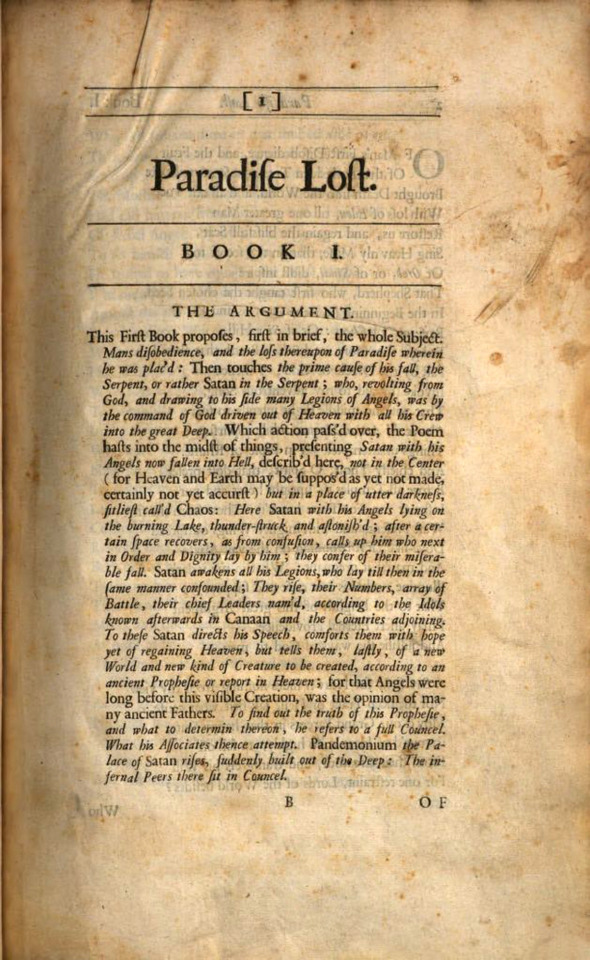
Use of the long S in print fell out of favor and disappeared abruptly in the UK after 1800.
Crowley's S-es could be a holdover from this: they both drop below the writing line, and they're both oversized.
What I think we can say for sure is that he's not very good at writing s-es, so they always turn out bigger than he intends. The S in "Beast" is noticeably different at the left curve than the S in "Worlds," which I would expect for someone who hasn't written thousands of s-es yet, and the S in "Worlds" looks very much like someone has faithfully rendered a shape they have seen rather than written a letter. Since he can write a letter r elegantly but can't do a curved s, it suggests to me that he hasn't had as much practice doing the curved s yet as he has the other letters, which fits with someone used to writing a long s 75% of the time.
Even the kerning speaks to me of someone who learned to write with a quill: leaving (comparatively) large spaces between letters gives the ink somewhere to drip and smudge without rendering the letter illegible.
There's one other reason I think Crowley probably learned to write in English in the 16th century: He's lazy, and he probably wouldn't have needed to know before then.
The movable-type press arrived in England in 1476. The Protestant Reformation kicked off in England c. 60 years later in 1534 when Henry VIII declared himself head of the English Church. Prior to the surge in literacy among the wealthy and merchant classes in the 16th century, thanks to this intersection of printing press and Protestants (who believe it's important that each person read the Bible for themselves), almost no one knew how to read, including most of the gentry and nobility, and still fewer knew how to write. If you had a message, you sent a guy or you showed up yourself. If you had something you wanted recorded, you summoned a scribe. If you needed to know something, you found somebody who knew and you asked them.
By the time of Queen Elizabeth's accession in 1558, 82 years after William Caxton began operating England's first movable-type printing press, a fully literate royal court were passing each other and their spies and their assassins gossipy notes like everybody was a 12yo in math class. Elizabeth wrote letters and poems. Among the gentry gentlewomen replaced monks as the medical caregivers for their communities (bc Henry shut down all the monasteries), and they wrote and shared and copied multi-generational "receipt books" and herbals of medical and cosmetic treatments. In the space of a single generation, literacy--the ability to write, not just to read--became a prerequisite for functioning in the upper echelons of society.
So if he didn't already know by then, Crowley would have needed to learn to write in English in the mid-16th century. And he would have had to learn it with a quill. (Wearing black probably came in handy for all the ink he spilled or dripped on himself.)
Last to consider is the W in "Worlds," which has no serifs and is not written with any particular attempt at straightness or symmetry. To me this suggests that Crowley learned to write w's from a modern reference, not his original reference. And this makes perfect sense: w was very much in use in the 16th century in English, but nobody agreed on how to write or print it, so there were crossed v's, two capital U's, and this weird gothic lowercase n with extra tentacles. W, Crowley would have learned, always needs to be checked up on before you commit.
Crowley's spelling here is modern, which is frankly a huge achievement for someone who was present for the formation and transformation of all 3 English languages. The contemporary Modern English we use today was a going concern for over 2 centuries before anyone wrote an English dictionary, and it was three centuries before dictionaries became authorities on how to spell correctly and people started giving a shit about that. (Before that as long as people could read the word and understand what you meant by it in context, you'd spelt it correctly.)
Taken together, the W and the modern spelling suggest that although Crowley almost never writes by hand, he reads regularly. This matches with two Words of God I've seen from Neil Gaiman (which I am too lazy to find and link) in which he mentions that Crowley likes to read but won't admit to doing so or to liking books.
Aziraphale should get him a book about ducks for Valentine's Day.
#good omens#good omens fanalysis#crowley#crowley's handwriting#good omens meta#good omens meta: crowley's handwriting
97 notes
·
View notes
Note
FRIENDSHIP BRACELETS?!?!?! THOSE TWO????
RIGHT?!
There's a part of me that wonders if it's either sarcastic (the way they laugh in the tomb without any real humor), or if maybe the friendship bracelets are... imbued with some kind of power, maybe? Like Harrow's "sewn tongue" needle literally ensorcelling Ianthe's jaw? What is a friendship bracelet at its roots but woven thread? We know Ianthe has the power of both mind and necromancy to reverse-engineer extremely complex processes...
But even if not, it's very What The Fuck Is Happening.
I feel like it's the latter. I don't think, knowing Tamsyn's writing style, that they'll be Actual Enchantments. I'm pretty sure Tamsyn's just trolling us, but like, with a purpose. Shock value and showing "a lot has changed for these two".
But it's still very "What the FUCK, Tamsyn!"
5 notes
·
View notes
Text
i didn't win the wheel: episode 8
(i made a post earlier as a preface as to what to expect in this IDWTW, check it out if you missed it)

Alex [leading the intro of the video]: "....Logan and I, we're here in honor of Wimbledon to play *turns to a detached and uninterested Logan* table tennis. Because nothing says Wimbledon like table tennis."
Logan [finally looking up right at him, starting to laugh]: "I think that's like... disrespectful..."
[they both laugh]
oh, alex. alex albon. you beautiful human being you. something i've mentioned earlier that i'm going to get into now: their dynamic is fluid and compatible and gentle, but it's hard to exactly fit them into roles because they switch back and forth. there might be two primary positions, but they flip back and forth between them easily depending on what the other needs. so Role A might have this sort of gentle leadership and reassuring presence, guiding the other through the task and getting them to engage with the game even as they're unfocused and overstimulated. Role B is a little lost, too in their head, unable to focus and unable to engage until they find themselves prompted by the reminder that oh, it's not just a game, it's a game with him. but it's impossible to put either of them down as always A or always B because earlier in the series we've seen logan help alex stabilize and recenter himself through his hyperactivity and now, more and more often, we're seeing alex coax logan out of his little shadowy corner. and alex does it in a way that even though it's an unspoken but obvious instruction (get your head in the game etc.) it's so personal it actually looks intimate, even on camera. the way he waits til the end of the sentence (while logan tries to pretend he isn't there) and then turns to face logan, lifting his arm to make a point but also opening up his shoulders toward logan and straight up leaning forward with that smile. he's tilting his entire face away from the camera so he can smile it logan, so he can say with his eyes "i know we're just doing this stupid challenge but i want you to know i'm not trying to drag you through it, i know you they're making you jump through these hoops and it's not fun and it's condescending and insulting, but i'm here and we're gonna do it and i'm gonna make this fun for you." and logan looks up and meets alex's eyes and they're so on each others' levels that these connections happen within a split second, almost easy to miss but when you catch a glimpse of it i feel like i'm intruding through the lens of the camera...
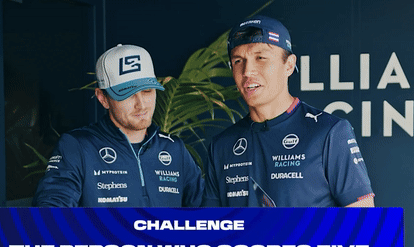
no reason to include this other than i felt like citing my sources (it's written all over their faces)

generally underwhelmed by william's admin choices for these videos. not only are the challenges really unoriginal, but they're also really simple. there's not a whole lot of challenge and there's also not a whole lot to go off. even ferrari adding a blindfold to everything ends up with better content than this. it should be obvious– mclaren admin has this down– but what makes the content popular isn't the score of the stupid table tennis game, it's the interaction. it's the dynamic. one of the reasons we're seeing alex go so obviously out of his way to bring logan into the picture is because admin has given them basically nothing to work with, so there isn't a backtrack of this is fun! this is interesting! this is amusing! to distract us. there's just alex wanting logan to have fun with him and logan not being in a situation to want or even be able to have fun.

[Pretty uneventful game over, Alex wins]
Alex: "5-3, to the champion, it's the– uh, this was a great victory for me and I'm, I'm very happy, I–"
Logan 😊😊: "Does that mean you could win Wimbledon?"
sorry if you ever thought you were babygirl for alex albon, logan sargeant has blown you out of the water. this is the cutest thing i have ever seen. this is how my dog looks at me when i come home from college.
ahhh this is nice to see. these are the roles i was talking about earlier. this is a pretty good callback to episode 5, but once again vice versa– then alex was still feeling hyper and silly from the game and logan was the one both guiding the activity and kind of letting alex calm down on his own time and still engaging him, now we've swapped. logan is almost looking at the camera now– he's almost doing the actual media presentation part of his job as opposed to the cap covering his face, head down, body language less expressive than a statue. only he can't make himself look at the camera for more than a few seconds because he's looking at alex.
he isn't even moving the video along. he's just straight up interrupting. alex has to due some mental and verbal gymnastics later on to get the activity back to the wheel-spinning part but still makes a point to segue from what logan's yapping about to the wheel instead of cutting him off completely.
also, round of applause for whatever moment between this video and last video where they've both become totally at one with the "awkward slanted shoulder one arm on the table so they can inconspicuously face each other" pose because unless they're actively swinging a paddle that's pretty much their default for this video. because that's the game for them. the fact that they're with each other.
i think i have one more episode to do. i'm still going to do it, because leaving this unfinished would somehow feel worse, as if none of this ever happened. but it fucking did. it was here and it's on video and alex fucking remembers and i'm not going to give up on immortalizing these moments and what they might have meant just because james consonants somebody wants to erase them.
#i didn't win the wheel#formula 1#f1 rpf#f1#williams#williams f1#f1 2024#sargebon#lolex#alex albon#aa23#ls2#logan sargeant#223#babygirl logan sargeant#how was that not already a tag#come on guys step it up#alex needs to stop looking away#alex you're missing the last rays of sunshine#that you're ever gonna have#memories#doomed love#doomed relationship#i wish that you could stay in my memories#but JV shows up today just to ruin things#goodbye my almost lover#writing#writers on tumblr#fanalysis
52 notes
·
View notes
Text
So I've been reading the Expanse novel series and jotting random reactions in this post, basically all comparisons between novels and the show, and now that I'm nearing the halfway point of the third book and the differences are getting more expansive (*rimshot*) my blather will also get more expansive, hence: new post.
[Disclaimer: this is all rooted in my opinions and preferences; I'm not suggesting my interpretation is *the* interpretation. Just wanted to say that now in case my language reflects otherwise]
The thing I keep coming back to now are the differences between the Holden of the show and the Holden of the novels. In the show, Holden reminds me of the Refusing The Call trope, but almost in the reverse - he's the main hero in the narrative sense (protagonist), but he's also that in the non-narrative sense. And while he has no interest in being a Hero with a capital-H, he has no qualms about doing heroic things, though to him they're not heroism but necessity, something born out of a sense of responsibility, wherever that sense may come from.
He isn't refusing the call so much as he never picked up the phone in the first place, but now he's found himself in a position of unintended celebrity, one that never names him as a hero but which is suggestive of the title, and which he doesn't care for outside of times it becomes useful for him to keep the things he cares about safe: his ship, his crew/family, and sometimes humanity as a whole (less personal investment in specific things, more value-based investment in doing what's right/just/kind).
This is a dude who just wants to live his damn life, but shit keeps going wrong around him and he's not someone who has it in him to stand aside and let it happen, so off he goes, running into danger, making This Is James Holden broadcasts, trying to solve one mystery or another. He wants to just be Some Guy, but being the way he is, caring about the things he does, prevents that. This gets 'textually' shown by the instances where people say he's special, or when he asks Proto-Miller why he's special, and so on.
In contrast, the novels seem more committed to the Some Guy aspect of his character. He does heroic things, but the heroism isn't so stand-out. His military experience comes to the fore more, skill-set wise: something born more of training than above-average ability. People other than him figure things out or come up with the creative solutions at times when the Holden from the show was the one to do it.
For example, the revelation of the speed-limit in the Ring: in the show we see him recognize what Proto-Miller is when he asks Monica about how things like hopes and fears can manifest, asking to see the footage of the Belter who's death activated it then footage of himself and saw that Miller appeared at the same time. He understands he needs to engage Miller to get answers. He does this in particular when the fake broadcast of him taking credit for blowing that ship puts the Rocinante in danger, isolating himself on purpose to do it, finding the right words that will get Miller to cooperate, then interpreting their meaning (the need to go in slowly) which births the plan to go into the Ring.
We even see a moment that shows how the crew dynamic has evolved: Amos' concern for his welfare, then two instances of showing trust that didn't exist before (when Holden explicitly asks for it, and again when Holden says he knows they need to go into the ring in this specific way and Amos backs him up).
Then we get to see the reverse: when Holden says they need to get the comms back up, emphasizes its importance, then looks at Amos, we see him trusting Amos in a way he very much didn't in the first season - trusting Amos to do what's needed without crossing any lines he doesn't have to. Even when Holden finds out later that Amos sent Cohen and Monica off the ship and Alex points out how Amos was less-than-gentle about it, instead of getting anrgy or making assumptions of violent intent, Holden just expressed an almost light-hearted preference that Amos check in with him first next time, which gets a 'sorry' from Amos, and then they move on. I really loved that, honestly.
Overall, I get the impression that the Holden in the show is more...clever, maybe. He doesn't have the kind of smarts Naomi does, but he's their ace when it comes to tactical thinking, and I don't mean in the military sense. Maybe not so much strategy with not always looking at the long term implications of some of his actions, but that could also boil down to his values: people are in danger right now, and he's going to do what he must to protect them and reduce harm to others in general. He's the optimist, as Avasarala says. He's lucky to have survived everything, as he himself says, because his own survival isn't the priority - he's the captain, his job is to keep his crew safe, and if 'crew' sometimes includes everyone in the vicinity (or everyone in general), well, then it does.
But the point is that the role he plays is bigger, and his ability to think on his feet, to be a good captain, to show compassion, to be *heroic* are more vital to events. The Holden of the novels does have a part in propelling the narrative along; of course he does, because he's a protagonist, and that's what a protagonist does. But the Holden of the show is much more core to that, at least in my opinion; that he's following 'the hero's journey', as Joseph Cambell named it, more obviously, even profoundly.
And as the show progresses, he slowly starts falling into the hero role ass backwards less and choosing it deliberately more, even if his disinterest in being defined as a leader on a bigger scale - Leader with a capital L - doesn't change. What happens at the end of the show is a great example of this: he doesn't want the president job, but everyone wants him to take it, and then we see that he only took it so he could make sure the person who *should* have been given that job (Drummer) gets it, because he knows that's what will pave the way towards social justice for the people of the Belt - something that we learned matters to him from near the beginning of the show (telling the interrogator why he punched a superior officer, thus leading to his dishonorable discharge, with his line about inner planets stepping on Belter necks and not wanting to be the boot). I got the impression that the Holden of the show might be more invested in the concept of justice, specifically social justice (as opposed to punative), than the Holden of the books.
It all adds up to a character that's more pointedly Heroic than his novel counterpart. Which is understandable: character dymanics in films and television generally call for that by dint of differences how the medium itself affect characterization and story. What is compelling on the page and compelling on the screen are defined in part by the format, in a number of different ways. What I'll be interested to see is how those differences continue to manifest, particularly when it comes to both characterization and character dynamics.
And, I can admit, I like a capital-H Hero. I liked seeing Holden being that clever, being that much more invested in his values, being that much more vital to events. Does that mean I like the Holden in the show more than the one in the books? Honestly, I think it's way too soon to say, same for the other characters.
But I can say I really miss Drummer.
3 notes
·
View notes
Text
Master List of my Ted Raimi gifs
Movies & Short Films (in order of release)
It's Murder (1977)
Acting and Reacting (1978)
Thou Shalt Not Kill... Except (1985)
Evil Dead II (1987)
Intruder (1989)
Easy Wheels (1989)
Shocker (1989)
Darkman (1990)
Lunatics: A Love Story (1991)
Eddie Presley (1992)
Clarissa X (1992)
Patriot Games (1992)
Candyman (1992)
Army of Darkness (1992)
Inside Out IV (1992)
The Finishing Touch (1992)
The Fountain Clowns (1992)
Skinner (1993)
In This Corner (1994)
The First Man (1996)
Apollo 11 (1996)
The Shot (1996)
Wishmaster (1997)
Freak Talks About Sex (1999)
Iggy Vile M.D. (1999)
The Attic Expeditions (2001)
Spiderman Trilogy (2002/2004/2007)
Fatal Kiss (2002)
Between the Sheets (2003)
Red Zone/Players (2003)
Tales from the Crapper (2004)
The Grudge (2004)
Illusion (2004)
The Man with the Screaming Brain (2005)
Freezerburn (2005)
High Hopes (2006)
The Damned Thing (2006)
Reign Over Me (2007)
My Name is Bruce (2007)
30 Days of Night: Dust to Dust (2007)
Millennium Crisis (2007)
Planet Raptor (2007)
Diamonds and Guns (2008)
The Midnight Meat Train (2008)
Angel of Death (2009)
Videodome Rent-o-Rama (2010)
Attack of the 50 Foot Cheerleader (2012)
Semblance (2014)
Darkness Rising (2017)
Deadwax (2018)
Warpath (2020)
Red Light (2020)
Failure! (2023)
Dante's Hotel (2023)
TV Episodes (in order of release)
Alien Nation (1989)
A.L.F. (1989)
Twin Peaks (1991)
SeaQuest (1993-1996)
Xena: Warrior Princess (1996-2001)
American Gothic (1996)
Hercules (1997-1998)
Invader ZIM (2002)
Odyssey 5 (2002)
CSI: NY (2005)
Supernatural (2008)
Legend of the Seeker Season One (2008)
Ash vs Evil Dead (2016)
Buddy Thunderstruck (2017)
Creepshow (2021)
Miscellaneous (no particular order)
The Quarry
Alone - Music Video
The Scariest Stories Ever Told
Random Ted Raimi Roles
Random Voice Acting Roles
Letterboxd Reviews
Ted Raimi Alphabet
Behind the Scenes (no particular order)
Millennium Crisis - Behind the Scenes
Skinner - Behind the Scenes
Eddie Presley - Behind the Scenes
Diamonds and Guns - Behind the Scenes
Darkman - Behind the Scenes
Morbid Minutes - Behind the Scenes
A Powerful Rage - The Grudge Behind the Scenes
Intruder - Behind the Scenes
The Thick Brown Line - Tales from the Crapper Behind the Scenes
Swallowed Souls - Evil Dead II Behind the Scenes
Medieval Times - Army of Darkness Behind the Scenes
Interviews/Documentaries (newest to oldest)
Chew on That Podcast (2025)
HorrorHound Weekend (March 2024)
Meet the Filmmakers (2024)
Steel City Con (December 2023)
Survival of the Film Freaks (2018)
From the Mouth of Babes (2016-2019)
Fanalysis (2002)
#ted raimi#my gifs#gifs#masterlist#master list#so many movies#so many roles#so many behind the scenes#voice roles too#and interviews
61 notes
·
View notes
Text
They knew, they just haven't been free to make it.
see. the issue is what maggie n nina pointed out after three days of knowing aziraphale and crowley. they don’t talk. they don’t communicate. they love each other, sure. they banter and have meals and drinks and would die for each other. but they spend so much of their relationship inferring how the other feels. assuming what the other wants. aziraphale assumed crowley wanted to be an angel again. crowley assumed aziraphale would be able to give up being one. they don’t have a middle ground bc they didn’t know one was necessary
14K notes
·
View notes